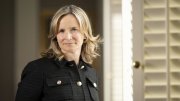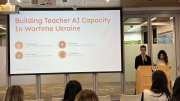The University has appointed Nonie K. Lesaux, Larsen professor of education and human development, dean of the Harvard Graduate School of Education (HGSE). She has served as interim dean since July, succeeding Saris professor of education and economics Bridget Terry Long. Lesaux, a developmental psychologist who has focused on improving students’ literacy outcomes, previously served as HGSE academic dean and faculty director of doctoral studies.
“For the past eight months, Nonie has led as interim dean with a wonderful combination of energy and insight,” President Alan M. Garber said in the University announcement. “Amid unprecedented challenges to both K-12 and higher education, she has demonstrated her ability to meet the moment, bringing to her work courage, humility, and respect in equal measure, motivated always by a deep sense of obligation to the school and its vital mission.”
Lesaux co-directs the HGSE’s Zaentz Early Education Initiative, which seeks to improve early education around the globe through research, professional development, and graduate training. The initiative includes Harvard’s Early Learning Study, a statewide analysis of early education’s impact on childhood development and learning. Lesaux has also studied literacy development and translated that work into books for educators and school leaders. Her research has influenced state and district reading policies, including Massachusetts legislation and literacy reforms in New York City and Chicago schools.
“This is a complex time for the education sector, but I can think of no institution better matched to address today’s needs,” Lesaux said in the announcement. “In the eight months since I assumed the role of interim dean, I have witnessed the ways in which our Ed School community has stepped up to think both critically and collaboratively about our mission and work in service to society. Our collective effort matters more today than perhaps ever.”
Lesaux joined the HGSE faculty in 2003 after earning her Ph.D. from the University of British Columbia and her undergraduate degree from Mount Allison University in New Brunswick, Canada. Her work has been recognized with honors including the National Science Foundation’s Presidential Early Career Award, the U.S. government’s highest honor for early-career researchers. In 2019, she was elected to the National Academy of Education. She also serves on the Spencer Foundation board and advises the U.S. Department of Justice on civil rights and educational opportunities.
“I’m delighted that Nonie Lesaux will become dean of the Harvard Graduate School of Education,” Provost John F. Manning said in the announcement. “She is a collaborative, creative, and inspiring leader, who will lead HGSE with distinction.”









